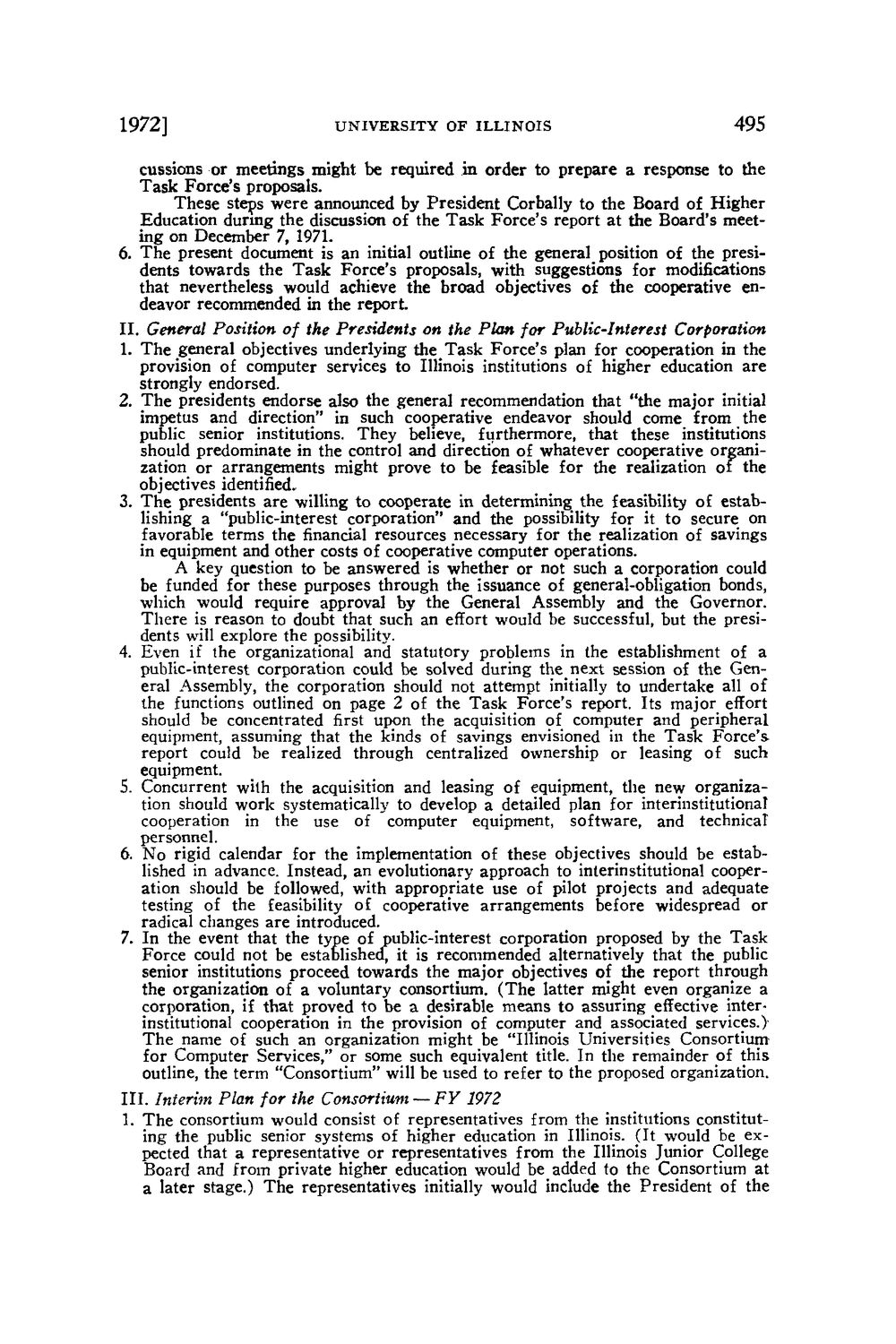| |
| |
Caption: Board of Trustees Minutes - 1972
This is a reduced-resolution page image for fast online browsing.

EXTRACTED TEXT FROM PAGE:
1972] UNIVERSITY OF ILLINOIS 495 cussions or meetings might be required in order to prepare a response to the Task Force's proposals. These steps were announced by President Corbally to the Board of Higher Education during the discussion of the Task Force's report at the Board's meeting on December 7, 1971. 6. The present document is an initial outline of the general position of the presidents towards the Task Force's proposals, with suggestions for modifications that nevertheless would achieve the broad objectives of the cooperative endeavor recommended in the report. II. General Position of the Presidents on the Plan for Public-Interest Corporation 1. The general objectives underlying the Task Force's plan for cooperation in the provision of computer services to Illinois institutions of higher education are strongly endorsed. 2. The presidents endorse also the general recommendation that "the major initial impetus and direction" in such cooperative endeavor should come from the public senior institutions. They believe, furthermore, that these institutions should predominate in the control and direction of whatever cooperative organization or arrangements might prove to be feasible for the realization of the objectives identified. 3. T h e presidents are willing to cooperate in determining the feasibility of establishing a "public-interest corporation" and the possibility for it to secure on favorable terms the financial resources necessary for the realization of savings in equipment and other costs of cooperative computer operations. A key question to be answered is whether or not such a corporation could be funded for these purposes through the issuance of general-obligation bonds, which would require approval by the General Assembly and the Governor. There is reason to doubt that such an effort would be successful, but the presidents will explore the possibility. 4. Even if the organizational and statutory problems in the establishment of a public-interest corporation could be solved during the next session of the General Assembly, the corporation should not attempt initially to undertake all of the functions outlined on page 2 of the Task Force's report. Its major effort should be concentrated first upon the acquisition of computer and peripheral equipment, assuming that the kinds of savings envisioned in the Task Force's report could be realized through centralized ownership or leasing of such equipment. 5. Concurrent with the acquisition and leasing of equipment, the new organization should work systematically to develop a detailed plan for interinstitutional cooperation in the use of computer equipment, software, and technical personnel. 6. No rigid calendar for the implementation of these objectives should be established in advance. Instead, an evolutionary approach to interinstitutional cooperation should be followed, with appropriate use of pilot projects and adequate testing of the feasibility of cooperative arrangements before widespread or radical changes are introduced. 7. In the event that the type of public-interest corporation proposed by the Task Force could not be established, it is recommended alternatively that the public senior institutions proceed towards the major objectives of the report through the organization of a voluntary consortium. (The latter might even organize a corporation, if that proved to be a desirable means to assuring effective interinstitutional cooperation in the provision of computer and associated services.) The name of such an organization might be "Illinois Universities Consortium for Computer Services," or some such equivalent title. In the remainder of this outline, the term "Consortium" will be used to refer to the proposed organization. III. Interim Plan for the Consortium — FY 1972 1. The consortium would consist of representatives from the institutions constituting the public senior systems of higher education in Illinois. (It would be expected that a representative or representatives from the Illinois Junior College Board and from private higher education would be added to the Consortium at a later stage.) The representatives initially would include the President of the
| |